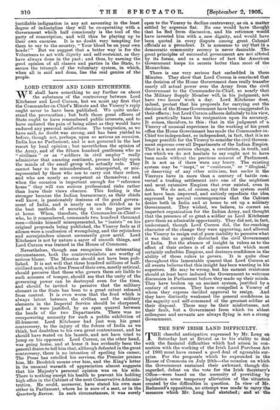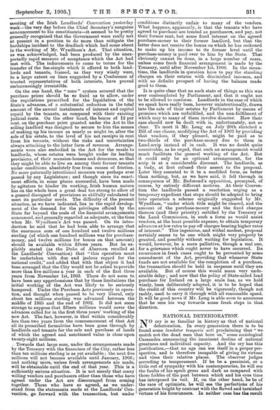THE NEW IRISH LAND DIFFICULTY. meeting of the Irish Landlords'
Convention yesterday week—the very day before the Chief Secretary's sanguine announcement to his constituents—it seemed to be pretty generally recognised that the Government were really not at present in a position to do more than mitigate the hardships incident to the deadlock which had come about in the working of Mr. Wyndham's Act. That situation, as was acknowledged, had been produced by the unex- pectedly rapid measure of acceptance which the Act had met with. The inducements to come to terms for the transfer of the fee-simple which it offered to both land- lords and tenants, framed, as they very wisely were, to a large extent on lines suggested by a Conference of trusted representatives of both interests, have proved embarrassingly irresistible.
On the one hand, the " zone " system secured that the purchase prices should be so fixed as to allow, -under the regulations prescribed for the liquidation of the State's advances, of a substantial reduction in the total amount of the annual instalments of interest and capital repaid by the tenants, as compared with their existing judicial rents. On the other hand, the bonus of 12 per cent. on the purchase price granted under the Act to the selling landlord was designed to secure to him the means of making up his income as nearly as might be, after the sale of his estate, to the level of his net receipts in rent from his tenants, without the risks and uncertainties always attaching to the latter form of revenue. Arrange- ments were also embodied in the Act for the resale to landlords, whose estates were bought under its leading provisions, of their mansion-houses and demesnes, so that they might be able to live on among their former tenants under conditions absolutely free from causes of friction. No more paternally intentioned measure was perhaps ever passed by any Legislature ; and. though since its enact- ment efforts, in some places successful, have been made by agitators to hinder its working, Irish human nature has on the whole been a great deal too strong to allow of a general disregard of provisions so skilfully calculated to meet its particular needs. The difficulty of the present situation, as we have indicated, lies in the rapid develop- ment of the demand for the privileges offered by the State far beyond the scale of the financial arrangements announced, and generally regarded as adequate, at the time when Mr. Wyndham's Act was passed. On its intro- duction he said that he had been able to arrange that the enormous sum of one hundred and twelve millions sterling (of which one hundred millions was for purchase- money, and twelve millions for bonus on that amount) should be available within fifteen years. But he ex- plicitly stated (as the Duke of Abercorn recalled at the Landlords' Convention) that "this operation must be undertaken with due and jealous regard for the national credit," and added that with that object it had been arranged that the City would not be asked to provide more than five millions a year in each of the first three years from November 1st, 1903. There do not seem to have been any apprehensions that by these limitations the initial working of the Act was likely to be seriously hampered. Under the Purchase Acts previously in opera- tion, and thought when passed to be very liberal, only about ten millions sterling was advanced between the middle of 1885 and the end of 1902. It did not seem strange to suppose that fifteen millions would cover the advances called for in the first three years' working of the new Act. The fact, however, is that within considerably less than two years from the commencement of that Act all its prescribed formalities have been gone through by landlords and tenants for the sale and purchase of lands of which the agreed. and sanctioned value is close upon twenty-eight millions.
. Towards that large sum, under the arrangements made by the Treasury with the financiers of the City, rather less than ten millions sterling is as yet available ; the next five millions will not become available until January, 1906; and nothing More, unless fresh arrangements are made, will be obtainable until the end of that year. This is a sufficiently serious situation. It is not merely that many willing vendors and purchasers other than those who have agreed under the Act are discouraged from coming together. Those who have so agreed, as we under- stand from the statements made at the Landlords' Con- vention, go forward with the transaction, but under conditions distinctly unfair to many of the vendors. What happens, apparently, is that the tenants who have agreed to purchase are treated as purchasers, and pay, not their former rent, but some fixed interest on the agreed purchase-money to their former landlord, but that the latter does not receive the bonus on which he has reckoned to make up his income to its former level until the purchase-money is paid over to him by the State. That obviously cannot be done, in. a large number of cases, unless some fresh financial arrangement is made by the Treasury, until after November 1st, 1906. In the mean- time, the landlords in question have to pay the standing charges on their estates with diminished incomes, and with no definite prospect of having the balance made good to them.
It is quite clear that no such state of things as this was ever contemplated by Parliament, and that it ought not to be allowed to continue. Landlords in the case of which we speak have really been, however unintentionally, drawn into the sale of their estates by Parliament by means of promises which are unfulfilled, and the non-fulfilment of which may to many of them involve disaster. How their case should now be dealt with is, unfortunately, not so clear. To meet it Mr. Long on July 20th sketched a Bill of one clause, modifying the Act of 1903 by providing that vendors, if they pleased, might be paid as to two-thirds of the purchase-money due to them in Land-scrip instead of in cash. It was no doubt quite conceivable, as he urged, that such an arrangement would much facilitate the general working of the Act. But it could only be an optional arrangement, for the scrip is at a considerable discount. The landlords, as a body, at first refused their assent to the proposal. Later they assented to it in a modified form, as better than nothing, but, as we have said, it fell through in consequence of Mr. Redmond's opposition, prompted, of course, by entirely different motives. At their Conven- tion the landlords passed a resolution urging as a temporary expedient that steps should be adopted to bring into operation a scheme originally suggested by Mr. Wyndham, "under which title might be cleared, and the amount of the purchase-money and the fixed charges thereon (and their priority) certified by the Treasury or the Land Commission, in such a form as would assist vendors, at the least possible expense, to obtain temporary advances at low rates to pay off charges bearing higher rates of interest." This ingenious, and withal modest, proposal certainly seems to be one which might very properly be granted, and possibly without waiting for legislation. It would, however, be a mere palliative, though a real one, for a grievance which ought never to have occurred. Its recurrence in fresh cases ought to be prevented by some amendment of the Act, providing that whenever State funds are not available for the completion of a purchase, the transaction should be held in suspense until they are available. But of course this would mean very unde- sirable delay ; and now that the policy of State-aided land purchase for Ireland on a large scale has, as we hold wisely, been deliberately adopted, it is to be hoped that the credit of this country will be vigorously, though not rashly, used to carry it through with all reasonable speed. It will be good news if Mr. Long is able soon to announce that he sees his way towards some fresh steps in that direction.



































 Previous page
Previous page